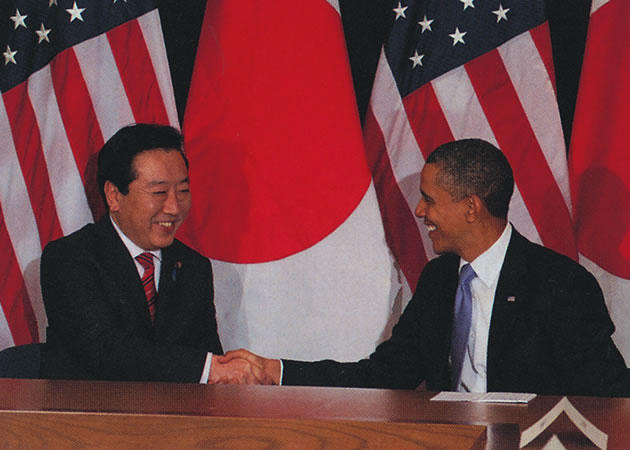2. North America
Japan and the United States are allies sharing basic values and strategic interests. The Japan-U.S. Alliance, with the Japan-U.S. Security Arrangements at the core, has brought peace and prosperity to Japan and the Far East for more than 60 years since the end of World War II. The Japan-U.S. Alliance is the linchpin of Japan’s diplomacy and security, and it serves as a public good contributing to the stability and prosperity not only of the Asia-Pacific region but also of the world.
Japan and the U.S. are closely working together and sharing their roles and responsibilities not only on bilateral issues, but also on regional issues in the Asia-Pacific such as those concerning North Korea and Myanmar, as well as on global issues such as assistance to Afghanistan and Pakistan and the Iranian nuclear issue.
The alliance is increasing its importance amid the dramatically changing international situation, such as the increasingly severe security environment in the Asia-Pacific region and the current state of the world economy, including the European financial crisis. The significance of the Japan-U.S. Alliance was also reaffirmed in the wake of the Great East Japan Earthquake, represented by Operation Tomodachi.
As reaffirmed repeatedly at the summits and foreign ministers’ meetings throughout the year 2011, Japan and the U.S. cultivated discussion on measures to deepen the alliance with a focus on security, economy, and cultural and people-to-people exchanges, including the Japan-U.S. Security Consultative Committee (“2+2” Meeting). As the U.S. has reaffirmed its policy to strengthen its commitment in the Asia-Pacific region, Japan and the U.S. have also been consistently working together, making use of the opportunities at the ASEAN-related ministers’ meetings, APEC, the EAS and other occasions, to build a prosperous and stable order in the Asia-Pacific region.
Japan and Canada cooperate closely in a wide range of areas such as politics, economy, security, and culture as partners in the Asia-Pacific region and also as G8 members, sharing fundamental values.
In 2011, Japan and Canada ensured their close cooperation through the three meetings between the Prime Ministers, which included one telephone talk, and one between the Foreign Ministers. In addition, starting in fall, there was a series of visits by Canadian ministers, including several by economic ministers. As for the Japan-Canada Economic Partnership Agreement (EPA), the Joint Study on the Possibility of a Japan-Canada EPA was started in March, and the exercises aiming to launch negotiation were progressed, despite the aftermath of the Great East Japan Earthquake.

Prime Minister Noda, left, meeting with the U.S. President Obama for the first time after assuming office
(September 21, New York, photo: Cabinet Public Relations Office, Cabinet Secretariat)
